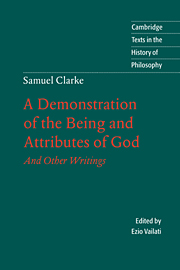Book contents
- Frontmatter
- Contents
- Acknowledgments
- List of abbreviations
- Introduction
- Chronology
- Further reading
- Note on the text
- A Demonstration of the Being and Attributes of God
- Other writings
- I Several Letters to the Reverend Dr. Clarke
- II The Answer to a Sixth Letter
- III The Answer to a Seventh Letter
- IV Letters to Dr. Clarke concerning Liberty and Necessity
- V From Remarks Upon a Book
- VI From Clarke's Sermons on Several Subjects
- VII From A Discourse concerning the Unchangeable Obligations of Natural Religion
- VIII From Four Defences of a Letter to Mr. Dodwell
- IX From A Collection of Papers which passed between the late learned Mr. Leibniz and Dr. Clarke
- Index
- Cambridge Texts in the History of Philosophy
VII - From A Discourse concerning the Unchangeable Obligations of Natural Religion
Published online by Cambridge University Press: 07 January 2010
- Frontmatter
- Contents
- Acknowledgments
- List of abbreviations
- Introduction
- Chronology
- Further reading
- Note on the text
- A Demonstration of the Being and Attributes of God
- Other writings
- I Several Letters to the Reverend Dr. Clarke
- II The Answer to a Sixth Letter
- III The Answer to a Seventh Letter
- IV Letters to Dr. Clarke concerning Liberty and Necessity
- V From Remarks Upon a Book
- VI From Clarke's Sermons on Several Subjects
- VII From A Discourse concerning the Unchangeable Obligations of Natural Religion
- VIII From Four Defences of a Letter to Mr. Dodwell
- IX From A Collection of Papers which passed between the late learned Mr. Leibniz and Dr. Clarke
- Index
- Cambridge Texts in the History of Philosophy
Summary
[Editor's Note: These eight sermons, delivered at St. Paul's Cathedral in 1705 constituted Clarke's second set of Boyle Lectures. The two selections deal with the passive nature of matter and clearly illustrate Clarke's radical views on this topic. The first excerpt is from Wii, 601; the second from Wii, 697–8.]
… Since matter is utterly incapable of obeying any laws, the very original laws of motion themselves cannot continue to take place but by something superior to matter continually exerting on it a certain force or power, according to such certain and determinate laws. And it is now evident beyond question that the bodies of all plants and animals, much the most considerable parts of the world, could not possibly have been formed by mere matter according to any general laws of motion. And not only so, but that most universal principle of gravitation itself, the spring of almost all the great and regular inanimate motions in the world, answering not at all to the surfaces of bodies (by which alone they can act upon one another) but entirely to their solid content, cannot possibly be the result of any motion originally impressed on matter, but must of necessity be caused (either immediately or mediately) by something which penetrates the very solid substance of all bodies and continually puts forth in them a force or power entirely different from that by which matter acts on matter.
- Type
- Chapter
- Information
- Samuel Clarke: A Demonstration of the Being and Attributes of GodAnd Other Writings, pp. 147 - 150Publisher: Cambridge University PressPrint publication year: 1998

